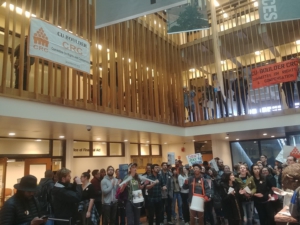
On February 5, around 500 graduate students and supporters gathered at Farrand Field on the University of Colorado Boulder campus to demand that UC stop requiring graduate students employed by the university to pay exorbitant student fees. They marched to the Regent Administrative Center, where administrators and bursar’s offices are located, to “pay” their last student fee–all at once, by check.
The community-backed action was called by the Committee on Rights and Compensation, a graduate student union seeking a collective bargaining agreement with the university.
The mandatory “student fees” amount to a severe tax imposed on low-paid graduate students holding vital teaching and research positions.
According to the CRC, graduate workers at UC typically make $21,434 per year. After student fees and other costs are siphoned back off by the university, average take-home pay drops to $17,872. In one of the least affordable states the country, this only covers 39-63 percent of the cost of living in Boulder.
By comparison, tenured and tenure-track professors at CU make between $100,000 and $160,000 per year, though graduate student workers perform similar teaching and research functions.
Graduate student and CRC organizer Janet Ruppert said, “It’s already so expensive to live in Boulder, and graduate students, we make anywhere between $20,000 and $24,000 a year which is pretty difficult to live on in Boulder, especially if you have student debt, or medical expenses, or if you have a family to support. The burden of student fees, a further tax on our already low income, is very difficult. By the time I graduate with my PhD, I will have given back $10,000 in student fees to the university.”
Graduate students’ wages are not livable. A big part of the reason why is because the university takes back a part of that wage as “fees.” Jeremiah Osborne-Gowey, a doctoral student in environmental studies said, “Can you imagine if you were in a job and you showed up to work, and the first day of work… they said, ‘We’re going to charge you for the lights. We’re going to charge you for a building fee because you’re working in this building. We’re going to charge you a technology fee because you have a computer we provide. Can you imagine doing that?”
As such, there is a push to eradicate higher-paid, tenure-track workers and replace them with associate professors, assistant professors, adjunct professors and low-wage graduate students who can be gouged with ever-increasing “student fees.”
The same administration that claims to prioritize the education of undergraduate students then turns around and underpays the graduate students responsible for much of undergraduate instruction. The quality of education falls as graduate student instructors are forced to find multiple jobs, live further away from the university and take on larger course loads.
As the crowd of hundreds marched to the administrative building, they were excitedly chanting: “Can’t pay–won’t pay, can’t pay–no way!” and “Education is a right, not just for the rich and white!” The chants did not end when the protesters entered the building. Shouts of “Union power!” echoed loudly through the halls. Organizers unfurled CRC banners and hung them from the balconies, while those on the first floor cheered them on.
When asked about what drew him to the union, graduate student and organizer Andrew Guttman replied, “It’s a group of people that recognize the value that we have as workers, and that we work better together as a group to make demands. We’re the people that do the work that keeps this school running. We shouldn’t have to pay to get what we deserve as workers.”
Since the union’s inception in 2016, graduate students have secured a 6 percent annual raise, three times the 2 percent percent offered by the school.
The union’s long term goals are securing more affordable housing, obtaining higher pay and more comprehensive benefits and ensuring the university and departments are places that welcome and support diversity.
At the culmination of the event, organizers led chants calling for the presence of top administrators by name. Unsurprisingly, none showed up to address the graduate students’ demands. The CRC’s fight for fair compensation will continue, but for now, the graduate students do not plan on paying any more student fees!





